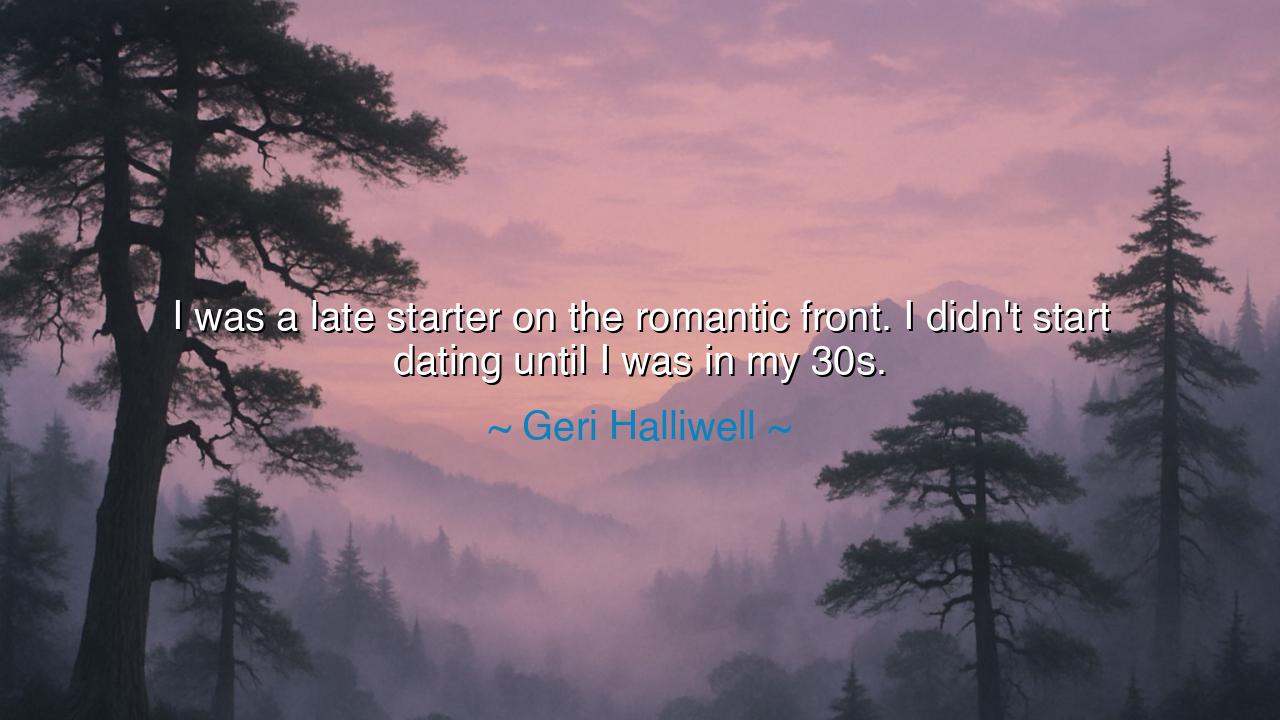
I was a late starter on the romantic front. I didn't start dating
I was a late starter on the romantic front. I didn't start dating until I was in my 30s.






In the plainspoken confession of Geri Halliwell—“I was a late starter on the romantic front. I didn't start dating until I was in my 30s.”—we hear a counter-melody to the drumbeat of haste. These words carry a lantern into the corridors of comparison, where many lose their way. They tell us that the heart is a vineyard with its own climate; some vines fruit in spring, others must know several winters before sweetness arrives. The ancients would call this the law of seasons: not all harvests are meant for early markets, and not all loves are meant to be gathered before noon.
To be a late starter is not to be behind—it is to be aligned with a different clock. The world counts years; wisdom counts ripening. On the romantic front, many march to trumpets of urgency, fearing the dust of delay. Yet the elder tongues remind us that ripeness is a covenant between seed and sun: it will not be hurried without harm. When Halliwell says she didn't start dating until her 30s, she refuses the tyranny of uniform timelines. She blesses the slow apprentice who learns the craft of self before apprenticing to the craft of two.
There is an ancient dignity in waiting. In the old temples, priests seasoned wood before fire touched it; green wood smokes, cured wood warms. So, too, the heart: unseasoned, it flares and chokes; seasoned, it burns with steady heat. The romantic front grows safer, truer, when the self has learned its weight and worth—when one can name desires without disguising needs, set boundaries without bitterness, receive affection without surrendering the backbone. The 30s are, for many, such a kiln; what emerges is less spectacle, more substance.
Consider the life of Julia Child. She did not meet her great love, Paul Child, nor discover her calling to the culinary arts, until her 30s and beyond. In youth she wandered, in her 30s she anchored, and in maturity she flowered—both in partnership and vocation. History remembers not that she was “late,” but that she was true. Her story is a generous map for anyone who feels out of step: the feast is not reduced by being served later; often it is improved. So it is with love: timing is an ingredient, and patience is a spice.
I think also of a friend, Nhi, who spent her twenties building a quiet life: caring for a grandmother, learning a trade, repairing the small boats of her mind after early storms. She didn't start dating until thirty-one. When she did, she chose not from panic but from peace. On their third walk, she asked the man, “What do you worship?”—not to test him, but to place the conversation where her life already lived. There was no masquerade; there was mirth, candor, and a shared respect for solitude. Years later, their home is not loud, but it is luminous. She calls her timing “late”; I call it right.
The lesson is stern and kind: let your season be your teacher. On the romantic front, early does not equal excellent, and late does not equal lacking. What matters is whether the self you offer has been honestly met—whether you can bear to speak plainly, listen deeply, and keep faith when the weather turns. A romance begun in the 30s may carry fewer performative flourishes and more practical grace: calendars negotiated with care, families considered with tenderness, futures imagined with a craftsman’s eye. The tempo is different, the dance no less beautiful.
Practical actions for those who feel “behind”: (1) Name your season without apology—write one paragraph that begins, “In this season, I am learning…,” and let it guide your choices. (2) Build your rule of life—three daily practices (rest, craft, movement) that keep you rooted whether or not love arrives this month. (3) Clarify non-negotiables—on one page list values, boundaries, and red flags; on the next, practices of repair and forgiveness. (4) Date as a curator, not a collector—fewer tables, deeper questions. (5) Keep counsel with elders who honor your pace; let no chorus of urgency drown your inner bell. Do these, and you will find that being a late starter makes you no less worthy; it often makes you ready. And readiness, more than rush, is how love recognizes its home.






AAdministratorAdministrator
Welcome, honored guests. Please leave a comment, we will respond soon